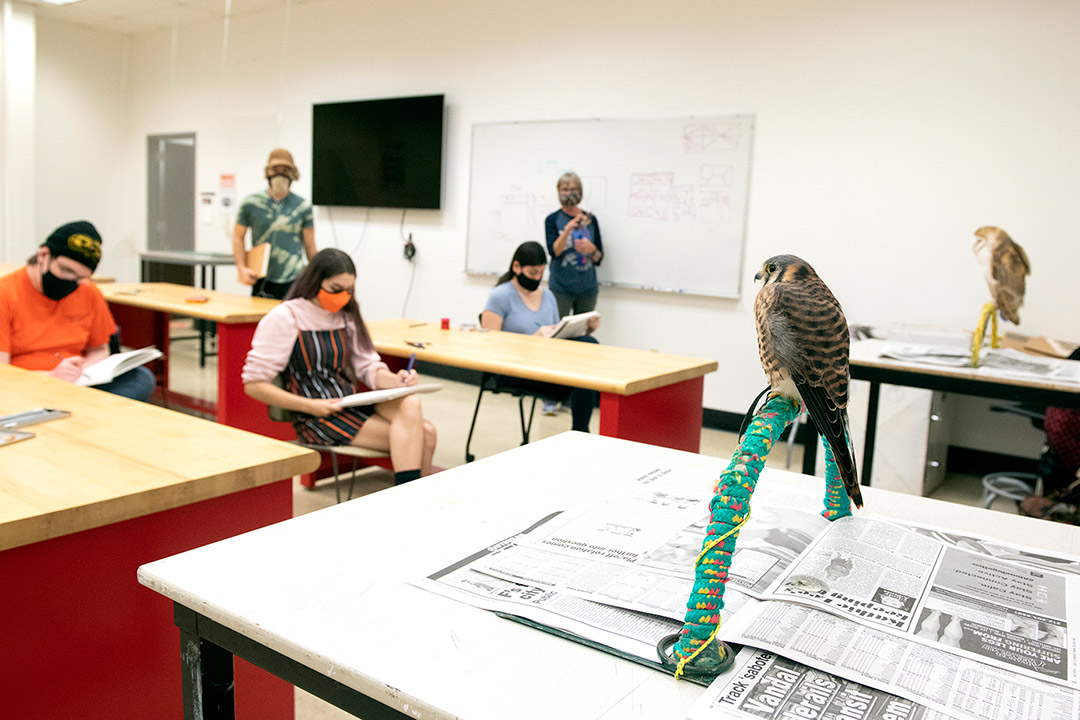Live birds, management for introverts, and creating new foods among classes awaiting RIT students
A. Sue Weisler
Students last semester drew live birds brought by the organization Wild Wings. A Zoological and Botanical Illustration class being offered again this spring allows students to accurately depict animals and plants for use in various media.
You thought 2020 was bad?
Try living in the dark underworld of 19th-century Victorian England, which featured poverty, cholera, epidemics, the Summer of the Great Stink (which led to the first modern urban sewage system), madhouses, arsenic poisonings, and Jack the Ripper.
Those topics will be discussed through literature in Victorians’ Secrets, a new RIT class being offered this spring in the Department of English. It is just one of several unique classes offered throughout the university being held in-person, online, or blended.
While some of the classes are for specific majors or require prerequisite classes, some of the courses are being offered as general education classes. Victorians’ Secrets is being held online for Honors students, but anyone with a 3.5 GPA may contact the instructor and Interim Department Chair Sean Grass.
An even more colorful course—literally—is Color Science for the Visual Arts. It is an interdisciplinary, online elective involving the intersection of science and art and builds on RIT’s rich history as a world leader in color science education and research. The course explores topics such as the building blocks of color, seeing color, producing color, displaying color, reproducing color, and conserving color.
“It is a course where computer scientists, chemists, and engineers can learn about the science of color in the context of its importance in fine art,” said Assistant Professor Susan Farnand. “But it is also a course that is intended to provide a comfortable environment in which art and architecture students can learn about how we perceive color and why lighting is a critical part of this experience.”
If food is more up their alley, students may take the Food Innovation and Development course in the Department of International Hospitality and Service Innovation in Saunders College of Business. They will be encouraged to stretch their culinary boundaries with hands-on creativity and innovation through experiments in food quality, recipe development, problem solving, experimental design, and data analysis. A series of research projects will focus on the assessment of new ingredients and technologies, and the creation and marketability of innovative new products. Past students have created chocolate recipes for Dove and developed uses for baby carrot by-products.
This spring, students will be working with a local food bank to create healthy, gourmet recipes from items that clients receive in their weekly deliveries. In addition, students will select a food industry challenge and run controlled experiments with test panels to solve the problem, such as making a better gluten-free cookie or creating a healthier, but still great tasting, pizza.
Live birds will make an appearance in the Zoological and Botanical Illustration class, which teaches art and design students to accurately depict animals and plants for use in various media. The birds are brought in by the Wild Wings organization.
The School of Individualized Study once again is offering a wide variety of classes this spring. Students in the blended Exploring Innovation class can learn how innovation happens; students can take intensive Making Comics online workshops to learn about storytelling with comics; students taking Community Folklife will learn in-person about cultural practices by engaging in international and regional examples of material culture, customs, rituals, and narrative traditions; and an on-line pop-up class, Introverts and Leadership, will offer success strategies for introverts in leadership roles.
And a number of classes have incorporated the pandemic’s ramifications and societal issues to be as current as possible. One such class is Health Care Economics, which discusses the economics of health care, as well as society issues like the opioid and fentanyl crisis. The class will be held in-person for students who have completed Principles of Microeconomics ECON 101.
Students interested in addressing “the socially-complex, wicked problems of our time” may consider Foundations of Community Engagement and Transformation, being offered in the Department of Science, Technology and Society. They will use literature reviews, discussions, case study analysis, role play, debates, and reflective writing to study community-engaged research and projects and investigate how successful community transformation occurs both locally and globally. Community experts will also be engaged. The course, taught in-person, incorporates humanities and social science perspectives and counts for general education requirements.
The Women’s and Gender Studies program with the College of Liberal Arts is offering Gender and Sexuality in Hispanic Studies, which offers an online study of gender and sexuality in Latinx and Spanish-speaking cultures. Gender, Science and Technology is an in-person class exploring the importance of gender within Western science and technology, looking at how masculine and feminine identities are socially and culturally shaped, how sex and gender are being significantly transformed, and how rethinking gendered practices may help make science and technology fairer and more responsive; and Topics in WGST: Women’s Science/Fiction is an in-person class bridging humanities and STEM-thinking to explore women’s contributions to science through fiction writing.
And a digital exhibit, Epidemics, Economics, and Elections, hosted by RIT Archives, is supporting the curriculum through editorial page cartoons drawn by Rochester cartoonists about the 1918 influenza pandemic. It will also feature student work on a page in a digital exhibit.


